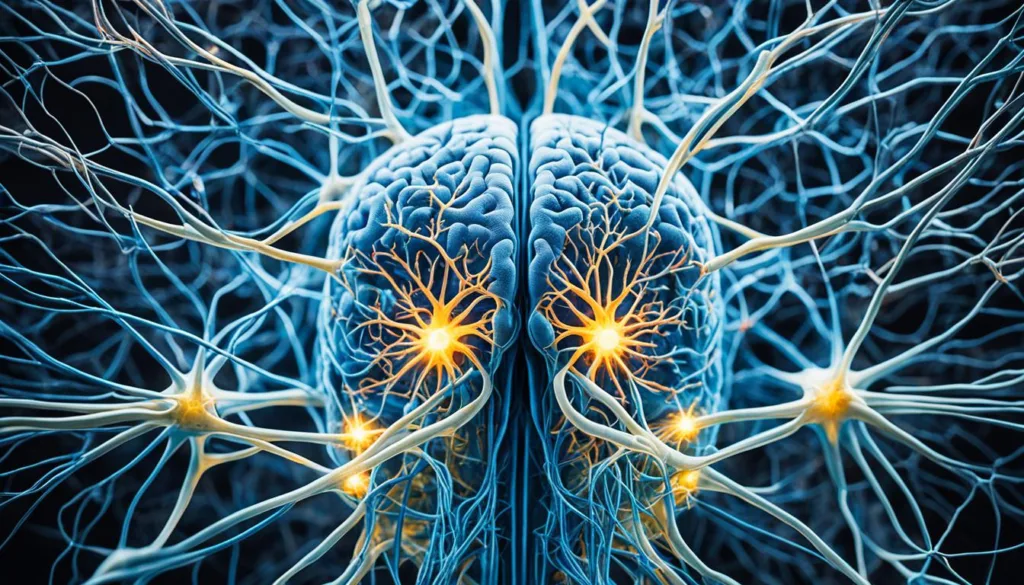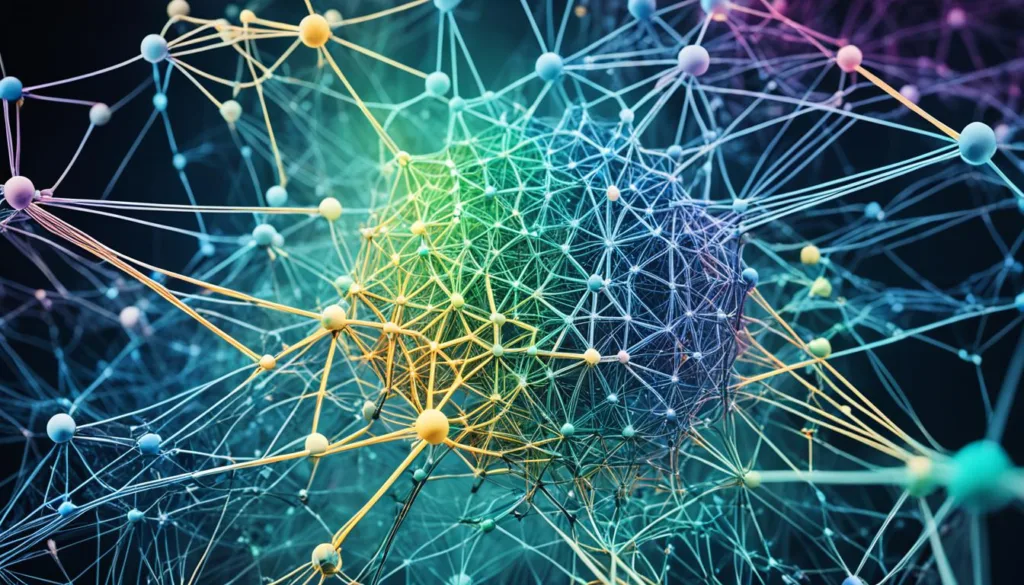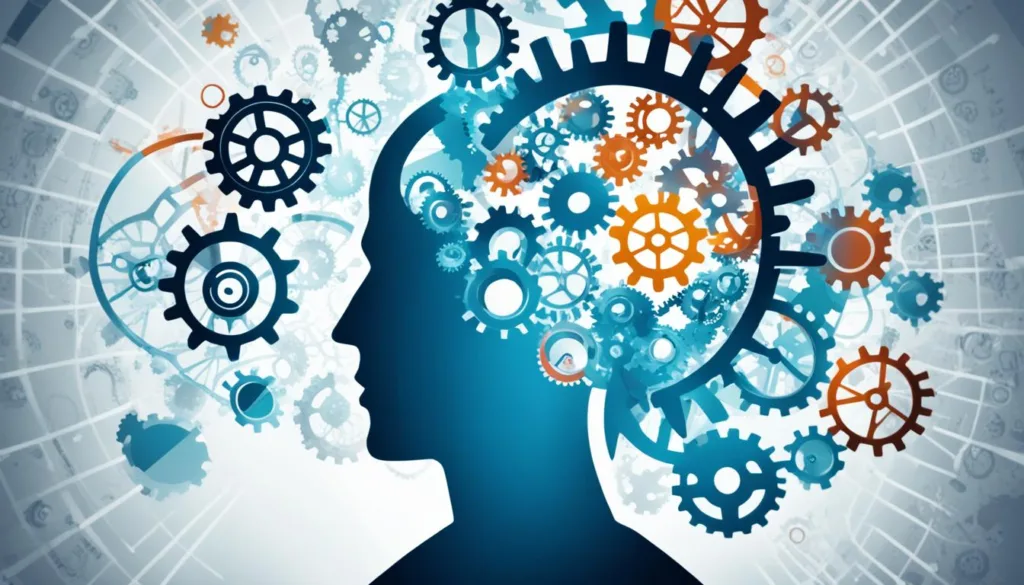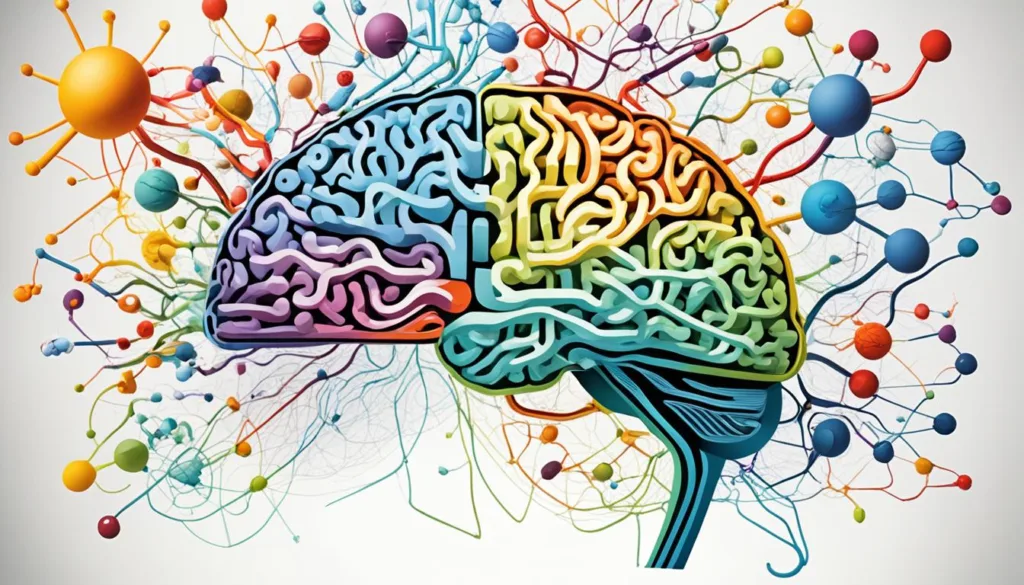Have you ever marveled at the speed and agility of your own thoughts, or pondered how you arrive at critical decisions? The tapestry of cognitive processes that waltz together in the vast ballroom of our minds is nothing short of miraculous. Delving into cognitive science opens a window into the nuanced choreography of brain function—revealing a world where every mental strategy, every nuance of information processing, is a stroke of biological brilliance.
From the tips of your neurons to the depths of psychological insights, you are the living embodiment of cognitive theory at work. Each mental function you perform, from recalling your favorite song to solving complex problems, dances to the rhythm of intricate cognitive processes. Here, in the words of Nobel laureate Daniel Kahneman, we’re poised to uncover the delicate balance between intuitive thoughts and logical deliberation, where the prowess of your brain’s functionality is laid bare.
Embrace this journey as we weave through the fabric of mental functions, pausing to appreciate the impact of each thread. Your mind is a storyteller, a strategist, and a scholar all at once, and it’s time we unpacked its mysteries. Are you ready to take a closer look at the marvel that is you?
Key Takeaways
- Discover the dynamic dance of cognitive processes that guide your every thought and action.
- Gain an intimate understanding of mental functions through the lens of cognitive science.
- Explore psychological insights from Daniel Kahneman’s division of the mind into System 1 and System 2 thinking.
- Learn how cognitive theory informs our grasp of brain function and impact on daily decision-making.
- Unravel the influence of mental strategies and information processing on your personal and professional life.
The Intricacies of Mental Functions
As you delve into the extensive world of cognitive science, you’ll discover that mental operations are not just mere acts of the mind but are deeply rooted in complex cognitive theory. Understanding your brain’s function is akin to exploring a vast and intricate network that executes a diverse array of mental functions with remarkable precision.
Breaking Down Cognitive Theory
Cognitive theory is your gateway to deciphering the codes of thought analysis. It’s a framework that explains how your learning, memory, and consciousness all intertwine to shape your mental operations. When you reflect on a past event or learn a new skill, you’re engaging with cognitive processes that cognitive theories seek to untangle and understand.
Brain Function: The Hardware of the Mind
The brain is your biological powerhouse, intricately designed to manage and regulate all cognitive functions. It’s where thought analysis occurs and mental operations are executed—where every blink, thought, and sensation is processed. Its capabilities are ever-expanding, with breakthroughs in cognitive science offering fascinating insights into its complex workings.
Pioneers in Cognitive Science: From Kahneman to AI
Leading figures like Daniel Kahneman have illuminated the nuances between the instinctive impulses of System 1 and the methodical logic of System 2. These distinctions highlight how cognitive ease can influence not only decision-making but also susceptibility to cognitive bias. What’s increasingly captivating is the new frontier where artificial intelligence and cognitive science converge, empowering researchers to deepen their analysis of the brain’s intricate architecture and thought processes.
| Mental Function | System 1 | System 2 | AI & Cognitive Science |
|---|---|---|---|
| Learning | Intuitive grasp of concepts | Logical reasoning and structure | Machine learning algorithms |
| Memory | Quick recall | Deliberate retrieval | Neural networks for pattern recognition |
| Consciousness | Automatic awareness | Reflective awareness | Brainwave analysis and cognitive models |
| Decision-Making | Heuristics and biases | Analyzed options and outcomes | Deep learning for predictive analytics |
The synergy between cognitive theory, brain function, and artificial intelligence not only elucidates the spectrum of cognitive science but also propels it towards unprecedented horizons. As you explore these realms, you’ll acquire a more profound appreciation for the delicate tapestry of mental operations that constitute human thought and intelligence.
Interpreting Thought Analysis Through Groundbreaking Research
The realm of cognitive science has seen an unprecedented evolution in recent years, with thought analysis leading to significant breakthroughs. Your understanding of the world around you, the decisions you make, and even your capacity to tackle complex problems are all influenced by deeply rooted cognitive processes. However, it’s only by dissecting these processes that we can develop effective mental strategies that align with our behaviors and goals.

In an effort to elucidate the intricate nature of behavioral control and goal-directed actions, current research zeroes in on brain regions such as the orbitofrontal cortex, dorsal striatum, and the hippocampus. These areas are seminal in our ability to carry out tasks with precision and to call upon memories when most needed. Cutting-edge methodologies such as single-trial activity pattern extraction and phase-amplitude coupling analysis are now spearheading our comprehension of the brain’s complex mechanisms.
These insights have not just remained within academic circles; they’ve paved the way for tangible innovations. Imagine, for instance, therapeutic applications where neurally controlled robotic arms and intracortical brain-computer interfaces emerge as lifelines for those grappling with motor impairments. Below is a concise depiction of some of the key relationships established between different cortical regions and the cognitive strategies they influence:
| Brain Region | Associated Function | Impact on Mental Strategy |
|---|---|---|
| Orbitofrontal Cortex | Value-based decision-making | Improves judgment and evaluation of pros & cons |
| Dorsal Striatum | Habit formation | Enables automaticity and skill mastery |
| Hippocampus | Memory consolidation | Enhances recall and learning adaptations |
“The human brain is an organ of dazzling complexity, a network of billions of neurons interconnected by trillions of synapses. We see, hear, and think with our brains, and it is our most valuable resource.” – Society for Neuroscience
The converging paths of neuroscience and technology beckon a future where not only do we understand these cognitive landscapes more intimately, but we also leverage this knowledge to foster advancements that were once in the ambit of fiction. By engaging with this groundbreaking research, you’re taking a leap into a world where the synthesis of cognitive processes and technology enhances the quality of life and unlocks potential in ways we are just beginning to grasp.
Unlocking the Secrets of Information Processing
As you delve deeper into the realm of cognitive theory, it becomes evident that information processing is a cornerstone of our understanding of complex cognitive processes. It is not just about the information that comes through our senses, but the intricate way in which our brain function decodes, analyzes, and utilizes that data to guide our actions and decisions.

Consider, for example, how your brain forms and retrieves memories—a critical element of information processing. This isn’t a simplistic file cabinet, but a dynamic process that involves layering experiences with emotions, sensations, and cognitive associations.
Patricia S. Goldman-Rakic’s groundbreaking work on the prefrontal cortex revolutionized our comprehension of working memory and decision making, illustrating the cerebral choreography of information management.
In light of cognitive theory’s advances, we’ve observed that artificial intelligence mimics these processes in a remarkable fashion. AI systems use data, much like the human brain uses past experiences, to anticipate patterns and inform future decisions.
| Brain Function in Information Processing | AI’s Parallel in Information Processing |
|---|---|
| Encoding experiences in neural patterns | Feature learning via autoencoders |
| Predictive modeling based on past information | Utilizing neural networks for pattern recognition |
| Regulatory role of the prefrontal cortex in behavior modification | AI behavior adjustment through reinforcement learning |
The discourse on information processing illustrates more than the brain’s agility; it underscores the symbiosis between human cognition and cutting-edge technology. You are at the forefront of a revolution in mental health solutions and an evolution of neuroscientific tools, where understanding cognitive processes transforms from abstract theory to tangible benefits in daily life.
Cognitive Processes in Decision Making
When you find yourself at the crossroads of a tough decision, your mind employs a sophisticated dance of cognitive processes. Delving into the realms of decision making, you’re actually activating a psychological seesaw that balances gut feelings with logical reasoning. Let’s explore how these processes intertwine, influence your choices, and can even lead to unexpected outcomes.

The Dual-Process Theory: Balancing Intuition and Rationality
Picture your thought process as a two-lane road: one is the fast lane of intuition – that’s System 1, making snap judgments based on familiar patterns. The other is the more scenic route requiring effort and analysis – welcome to System 2. The dual-process theory posits that these systems are the building blocks of your decision making, each taking the lead when most suited for the task at hand.
Psychological Insights: Biases and Heuristics
However, the journey toward a rational decision could be laced with mental shortcuts, known as heuristics. These cognitive trail guides simplify the complexity of the world but can introduce errors in judgment called biases. Your brain’s built-in biases and heuristics serve as evidence of the economy of our cognitive resources, though they often steer you away from purely logical conclusions.
Prospect Theory: Reassessing Risk in Decision Making
Moving beyond the heuristics, the prospect theory provides another lens to observe decision making, especially when risk is at play. It suggests that your perception of potential risks and rewards is framed by personal and situational contexts, not just by the objective outcomes. The prospect theory enlightens us on why you might take an unexpected gamble or play it safe, dictated by the psychology of relative gains and losses.
| Cognitive Process | Feature | Impact on Decision Making |
|---|---|---|
| System 1 (Intuition) | Fast, automatic, emotional | Quick decisions based on gut feeling; susceptible to biases |
| System 2 (Rationality) | Slow, effortful, logical | Thoughtful decisions requiring more time but potentially more accurate |
| Biases and Heuristics | Mental shortcuts, error-prone | Can lead to systematic deviations from rationality |
| Prospect Theory | Risk-assessment relative to reference point | Influences risk-taking and loss aversion behaviors |
Neuroscience and AI: Collaborators in Decoding Cognitive Strategies
As we delve deeper into the realm of cognition, we encounter the fascinating intersection of neuroscience and artificial intelligence. Together, they form a powerful alliance that is unlocking the mysteries surrounding cognitive strategies and revolutionizing the way we perceive and engage with the mind’s capabilities.
The Convergence of Brain-Computer Interfaces and Cognitive Analysis
Innovations in neuroscience have given rise to advanced brain-computer interfaces (BCIs) that are redefining communication possibilities, especially for those with significant motor disabilities. This technology is not just a conduit of interaction but also a window into the brain’s functioning, rendering observed cognitive strategies in real-time.
Machine Learning: A New Frontier in Cognitive Decoding
With artificial intelligence at the helm, machine learning paves the way for interpreting intricate brain data. Algorithms such as Support Vector Machines (SVM), Random Forest, and Hidden Markov Models (HMM) apply their pattern-recognition might to neurological datasets, unveiling previously concealed aspects of cognitive processes.
Revolutionizing Cognitive Therapy with AI-Driven Insights
AI-driven insights gleaned from rich data analysis are setting a new standard in cognitive therapy. Personalized, scalable, and effective, these pioneering therapeutic techniques are sculptured from the wealth of nuanced information that machine learning and neuroscience collectively contribute.
The Socioeconomic Implications of Cognitive Science
As we peel back the layers of cognitive science, we unveil its substantial influence on the world around us. The intricate cognitive processes that underpin our everyday choices extend far beyond the individual, echoing through the broader scope of socioeconomic frameworks.
The revelations within cognitive science have reshaped our understanding of mental operations, illuminating pathways to empower education, propel businesses, and bolster economic practices. The tenets of cognitive processes are not just esoteric knowledge but practical insights that when leveraged, can transform entire industries and societal norms.

Socioeconomic Growth: As you explore the ramifications of cognitive science, you witness its potential to refine educational methods, enhancing the way knowledge is imparted and assimilated. In the professional realm, it fine-tunes workplace efficiency, advocating for environments that align with our natural cognitive tendencies. Simultaneously, it informs the realm of economics, offering a clear vantage point of how mental operations steer significant financial decisions and market dynamics.
“The true sign of intelligence is not knowledge but imagination.” – Albert Einstein
Application in Industries: A riveting example is the perspective changes in healthcare and marketing stemming from an acute awareness of psychological underpinnings in consumer behavior. Academic theories, such as Daniel Kahneman’s cognitive biases and prospect theory, are now applied lenses scrutinizing and predicting market trends with greater precision.
- Optimization of learning models based on cognitive studies
- Integration of AI and neuroscience leading to improved mental health services
- Enhanced consumer experiences through targeted marketing strategies
- In the classroom, educators use cognitive principles to tailor teaching methods, catering to diverse learning styles.
- In the offices, employers implement cognitive-friendly practices to boost productivity and employee satisfaction.
- In markets, leaders apply cognitive findings to fortify financial strategies, understanding the depth of the public’s decision-making processes.
Cognitive science, thus, is not merely an abstract concept but a practical toolkit; a lens to see the varied socioeconomic implications that shape our world. Embracing this science could mean the beginning of a new era in human progress—one informed by the subtleties of our own minds.
Conclusion
As the curtain closes on our exploration of the mind’s labyrinth, your journey through the variegated landscape of cognitive processes draws on the pioneering work of Daniel Kahneman and extends toward uncharted territories. The revelations from “Thinking, Fast and Slow” provide a beacon for the enthralling voyage of cognitive process research. You stand at the cusp of a cognitive revolution where research and innovation converge, promising to deepen our understanding of how mental processes shape every facet of existence.
Future Directions in Cognitive Process Research
Your adventure through the domain of cognitive insights is poised to continue as researchers delve further into the brain’s complexities. The quest for knowledge in cognitive process research is unending, with each discovery propelling us toward a horizon brimming with potential. As neuroscience and artificial intelligence interlace, they form a vanguard in advancing our grasp of brain function and cognitive strategies.
Enhancing Life with Cognitive Insights: An Integrated Approach
An integrated approach that marries the intricate science of the mind with the ever-evolving sophistication of technology heralds a new paradigm in enhancing life quality. Cognitive insights gleaned from such partnerships hold the promise to ameliorate mental health, tailor education, and innovate interactions within our technological and ecological environments. Your understanding of cognitive processes becomes not just a scholarly pursuit but a practical instrument to navigate a world in flux.
Thoughts on the Threshold of a Cognitive Revolution
As we stand on the brink of this cognitive revolution, we cannot help but be optimistic about the future. The collective efforts in the realms of cognitive process research are illuminating a transformative path that could redefine how you think, learn, and decide, paving the way for a society that’s more intelligently aware and empathetically aligned. Ready your mind for the exciting developments that lie just beyond the threshold, destined to craft a narrative of intelligence and insight for generations to come.
FAQ
What are cognitive processes and how do they impact our lives?
Cognitive processes are the mental functions we engage in when acquiring knowledge and understanding. They include perception, thinking, memory, attention, language, problem-solving, and decision making. These processes impact virtually every aspect of our lives, influencing how we learn, interact with others, make decisions, and perceive the world around us.
Can you explain cognitive theory?
Cognitive theory is a psychological approach that attempts to explain human behavior by understanding our thought processes. It assumes that our mental functions can be understood as information processing systems and looks at how we solve problems, form memories, perceive our environment, and use language, all of which influence our behavior and experiences.
How does brain function relate to cognitive science?
Brain function is the biological underpinning of all cognitive processes. Cognitive science combines knowledge from psychology, neuroscience, and several other disciplines to understand how the brain operates, processes information, and supports our mental functions. Advances in understanding brain function have significant implications for improving cognitive science.
Who are some pioneers in cognitive science, and what are their contributions?
Pioneers in cognitive science include individuals like Daniel Kahneman, who introduced the dual-process theory of cognition, highlighting the roles of intuitive and rational thought. Other contributors encompass AI researchers who apply machine learning to mimic and understand cognitive functions, paving the way for innovations in how we interpret the human mind.
What is thought analysis, and why is it important?
Thought analysis involves examining the processes and content of thinking to understand how people make sense of information, form decisions, and solve problems. It’s crucial as it can reveal patterns, biases, and heuristics that influence decision making, leading to better outcomes in fields such as psychology, education, and artificial intelligence.
What does information processing have to do with cognitive processes?
Information processing is a core concept of cognitive theory that describes how the mind processes incoming information. How we perceive, pay attention to, and remember information is critical to understanding cognitive processes. It’s a fundamental aspect of learning, decision making, and problem-solving.
How do biases and heuristics affect our decision making?
Biases and heuristics are mental shortcuts that our brains use to simplify decision making. While they can be efficient, they often lead to errors or cognitive biases that can skew judgment and lead to poor decisions. Understanding these can help individuals and organizations make better, more rational decisions.
What is Prospect Theory, and why is it significant?
Prospect Theory is a behavioral economic theory developed by Daniel Kahneman and Amos Tversky, which describes how people choose between probabilistic alternatives that involve risk. It’s significant because it demonstrates that people’s decisions are not always rational or in their best interests, and are deeply influenced by their potential gains or losses relative to a reference point.
How are neuroscience and AI collaborating to decode cognitive strategies?
Neuroscience and AI are collaborating to create advanced technologies like brain-computer interfaces, which allow the brain to communicate directly with machines. AI algorithms help decode and interpret the brain’s signals. This partnership furthers our comprehension of cognitive strategies and has the potential to remarkably enhance life for those with physical and cognitive impairments.
How is cognitive science revolutionizing cognitive therapy?
Cognitive science is revolutionizing cognitive therapy by introducing AI-driven insights that provide personalized treatment plans. These involve machine learning algorithms that can analyze vast amounts of data to identify patterns and predict outcomes. This can lead to more precise and effective therapies tailored to individual needs.
What are the socioeconomic implications of advancements in cognitive science?
Advancements in cognitive science have broad socioeconomic implications. For example, a deeper understanding of cognitive processes can improve educational methods, enhance productivity and workplace satisfaction, and lead to better informed economic decisions. Industries such as health care and marketing can greatly benefit from these insights, leading to more effective and customer-focused strategies.
What future developments can we expect from the field of cognitive process research?
In the future, we can expect cognitive process research to advance our understanding of the brain and how we think, learn, and make decisions. We might see new treatments for cognitive disorders, better educational technologies tailored to individual learning styles, and AI systems that can interact with humans in more sophisticated and empathetic ways.

